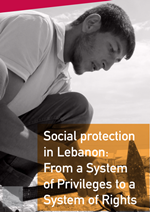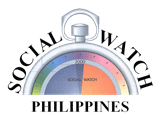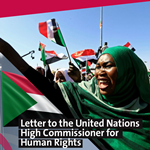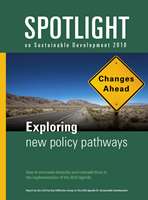Social Watch news
Published on Thu, 2019-02-21 09:16
The 2030 Agenda for Sustainable Development has become a premier driver and justification for institutional and financial reforms along with the collection and analysis of more and more sophisticated data and statistics. Many UN Commissions are contributing to the implementation of the 2030 Agenda and achieving the Sustainable Development Goals (SDGs). One of these is the UN Statistical Commission, which meets for its 50th annual session 5 - 8 March 2019 at the UN headquarters in New York.
Big data, geospatial data, national statistical capacity, and common standards for the exchange of data are among some of the agenda items the Commission will address, along with progress on the SDG indicator framework.
|
Published on Mon, 2019-02-18 11:59
In Palestine, the main obstacle to realizing the SDGs is the occupation that continues to confiscate lands and, as reported by UNCTAD, deny Palestinians the human right to development. The indicators are alarming: unemployment has reached 27.7 percent in the Palestinian territories occupied in 1967 and 44 percent in the Gaza Strip. The poverty rate for the year has reached 29 percent in 2017 and it is 53 percent in the Gaza Strip, reflecting the catastrophic effect of the 10-year ongoing blockade.
|
Published on Mon, 2019-02-18 11:55
In Nicaragua, the joint report of Coordinadora Civil and the National Platform in Defense of Water and Life, argues that access to water is both a human right and one of the Sustainable Development Goals”. Nicaragua is suffering a shortage of safe water as a result of the combined effect of climate change that reduces superficial water and the unregulated extraction of underground water by industrial agro-exporters and enclave tourism.
|
Published on Fri, 2019-02-08 19:04
Lebanon presents an interesting case when it comes to social policy. In fact, when the developmental state model was being implemented all over the world, Lebanon was adamant in its laissez-faire economy. The developmental state has brought about welfare regimes and what was called welfare states in advanced capitalist economies in Europe. In parallel, except for a few years, Lebanon has opted for minimal state intervention in public policy, and social protection in general. This has been exacerbated in the reconstruction period where the private sector and non-state actors dominated the realms of social services and protection, such as health and education. In recent years, and with social protection gaining momentum on the international level, the discussion on social protection and social security resurfaced in Lebanon. This has been accentuated as studies and reports on alarming poverty rates, inequality and unemployment in the country became recurrent.
|
Published on Wed, 2019-01-23 16:08

|
Human rights are the departure point for the civil society critique of official policies in Mexico. Mexican civil society organizations demand coherence between the 2030 Agenda and governmental policies in economic and energy matters. They claim that the ongoing reform of the energy sector prioritizes business activities of exploration and exploitation of hydrocarbons over any other activity in the territories and without the necessary safeguards that effectively protect water, biocultural heritage, health of people and communities.
As a result of the examination carried out in March 2018, the UN Committee on Economic, Social and Cultural Rights recommends that the Mexican State takes full account of its obligations under the International Covenant on Economic, Social and Cultural Rights (ICESCR) and ensures the full enjoyment of the rights recognized in it in the implementation of the 2030 Agenda at the national level. It also encourages the State to establish independent mechanisms to monitor progress and treat beneficiaries of public programmes as holders of rights to which they may be entitled.
|
Published on Wed, 2019-01-23 16:05
In the Philippines, with a huge mandate to back it up, the government of President Rodrigo Duterte (locally referred to as “DU30”) set off on a long-term goal consistent with the 2030 Agenda, promising to end poverty by 2040 and building a more fair, prosperous, stable and peaceful society through inclusive economic growth that minds environmental limits.
Two years down the road, Isagani Serrano, president of the Philippines Rural Reconstruction Movement and a convener of Social Watch Philippines, reports that “DU30 appears on track with its 7-8 percent annual economic growth target because of a massive ‘build, build, build' infrastructure programme accounting for 5.4 percent of GDP in 2017. The negative impact of this programme, specifically conversion to other land uses of already diminishing farmlands, is still to be determined. But the fossil fuel- intensive infrastructure and power programmes and projects could reverse modest gains achieved in environmental protection and rehabilitation.”
|
Published on Wed, 2019-01-23 09:56
The year 2019 is starting full of uncertainties and also of hopes. In a fast changing and unpredictable world, our voice and the voices of the people that we try to express and amplify need to be heard. Our governments and the powerful of the world need to be made accountable.
In 2019, as we have been doing since the adoption of the 2030 Agenda and its Sustainable Development Goals, the Social Watch network will contribute to the global Spotlight report and we will help disseminate the independent reporting of civil society and bring those findings to the United Nations' High Level Political Forum (HLPF).
The HLPF is the United Nations body mandated by the 2030 Agenda to have a “central role in overseeing a network of follow-up and review processes at the global level.” The HLPF will meet at ministerial level in New York, next July 9 to 18 for an in-depth review of Goals 4, 8, 10, 13, 16 and 17 (the so called “political goals”, including inequalities, governance and implementation). The theme will be "Empowering people and ensuring inclusiveness and equality".
|
Published on Wed, 2019-01-23 09:23
Peaceful protesters in Sudan continue to face systematic and gross human rights violations. Since the first day of protests their legitimate and peaceful demands for economic, social and political reforms, which came in response to the dire austerity measures implemented, widespread corruption and social injustices have been faced by excessive use of force, killing by live ammunition, mass arrests and detention of critical voices by government security forces and allied militia. Thus far between 40 and 75 have been reported killed according to national and international human rights groups (the government admitted killing 24).
Thousands of protesters have been arrested including the Arab NGO Network for Development Sudanese member, National Civic Forum Secretary General Hasan Abdel Ati. Furthermore, through internet disruptions, censorship of media the Sudanese authorities try to block access to information and cut off the Sudanese civilians, activists and human rights defenders from international observation.
|
Published on Wed, 2018-12-26 11:40
Around 40 protesters were shot dead, dozens were injured by live fire used as well as tear gas and rubber bullets in Sudan in one week of demonstrations. The protests started on December 19th, in the northern Sudanese city of Atbara, spread to many other cities and reached to the capital Khartoum. Sudanese government response to these protests has been excessive use of force, arbitrary arrests and detention.
Chants calling for President Omar Al-Bashir to step down reflect people’s voices of frustration for the dire economic and social conditions, social injustices and widespread corruption.
|
Published on Thu, 2018-12-06 18:37
For about 12 hours there was a target on education financing in what was about to become the 2030 Agenda. It was proposed in the very last round of negotiations of the Open Working Group on Sustainable Development Goals and it did not take long before it was shot down; Member States said it was not feasible to prescribe percentages of public spending to the different goals, and that it would place the goals in competition with each other. Subsequent Financing for Development negotiations saw Member States reject the proposed commitment to “setting nationally appropriate spending targets on essential services, including education…”, shocking the Norwegian co-facilitator, who said he thought education financing was uncontroversial.
Yet, at the end of the MDG era, it was clear that the lack of financing was one of the main reasons behind lagging progress in achieving universal primary education. Aid to education has dropped many years in a row, amounting to 6.9 percent in 2015, and only 2.7 percent of humanitarian aid is directed to education.
|
SUSCRIBE TO OUR NEWSLETTER
Submit

|










